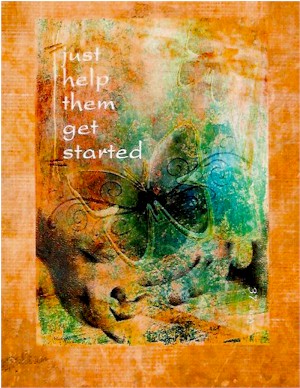
At a conference last year of some of the world’s most renowned and experienced researchers, I asked the question: “What is the defining characteristic of great research?” The most impressive answer I heard had nothing to do with diligence, breadth or depth of work, or even analytical quality. It was:
“It asks important questions.”
Note that it doesn’t need to answer them. What makes a question important is that it is a gateway, a key, an avenue of exploration, a means of “just helping people get started“. And that it is novel, not obvious (except perhaps in hindsight), provocative, and insightful.
That’s a lot to ask of a question. But such questions are not only the key to great research, they are key to all sorts of doors that, in our world of imaginative poverty, would otherwise remain closed, unexamined. Doors such as:
- How to heal someone who is suffering. Can you tell me about it, talk me through it so I understand? can be a great question for helping those in pain put it in perspective, name it, get it out from inside them, and that can be the start of healing. It’s usually more important to seek to understand than to proffer solutions. Ask the person to tell you a story. Listen and ask questions until you understand. Chances are when you do, they’ll feel better about it, just by this process.
- How to get someone unstuck. What do you think is holding you back? and What does your heart (or what do your instincts) tell you? are great questions for moving people forward.
- How to make time for important activities instead of just urgent ones. If you didn’t do this (urgent) task, now or ever, in five year’s time who would really care? is a great question for helping people learn to say ‘no’.
- How to create a great Natural Community. What is it about certain places that cause you to love them, seek them, be drawn in by them, get homesick when you’re away from them? is a great community-creating question.
- How to create a great Natural Enterprise. Who needs your gift now? and What’s in your ‘sweet spot’? and How could we make this easier, or more engaging? are great enterprise-creating questions.
- How to create a great Natural Economy. Why do we need growth? and What would a world without the need for money look like? are great economy-creating questions.
- How to create a great process for Natural Learning. What do people love doing so much they would do it for free? is a great learning process-creating question.
- How to break through a really intractable, wicked problem. What would it look like if the people suffering from this problem had the capacity to solve it themselves? is a great intractable problem-busting question.
(Lots more possible applications, and lots more important questions you could pick, but you get the idea.)
Great questions are opening, not narrowing. They smash dichotomies rather than funneling people into them.
Great questions are an invitation to great conversation.
Many great questions start with “What if…?”
And, perhaps most important, great questions tap into things that people care about. Great questions + passion = a recipe for moving forward, energetically and enthusiastically.
So how do we learn how to identify and pose important questions? Here are some ways that have worked for me:
- Give yourself time to reflect, think, decide. The number one problem business executives tell me they face today is that they don’t have enough time to really stop and think about what they’re doing, and other possibilities. The Obama Wall Street bailout gang are perfect examples of this.
- Be fully present (intellectually, emotionally, sensually, physically) as you think about an issue or challenge. Give it your full attention. Trust your instincts. Then suppose.
- Practice imagining possibilities.
- Change your point of view: How might this be seen from a completely different perspective? How do others see it? Get outside yourself, and outside your head.
- Create stories — future state, other world, other time, other culture. Make it up. Questions will follow, and some of them will be important.
- Play — games, simulations, improvisations, “what if”.
- Have conversations and collaborations — with imaginative, objective (but caring), thoughtful, informed (but not too lost in the details) people. Draw on the wisdom of crowds.
- Suspend your disbelief. Sometimes ‘impossible’ questions are the most important ones.
- Don’t pay attention to the critics. Vexatious and negative people will drain you. They think all questions are foolish. Laugh them off, boot them out, do whatever it takes to keep their toxic attitude from preventing you from doing what they ‘know’ is impossible.
- Practice thinking differently.
What’s holding you back from doing what you want to do, intend to do, love doing? What important question could you ask yourself about that challenge that might change everything?
Want to save the world, and yourself? Start by asking the right, smart, creative, provocative, important questions.
|






Reminds me of Edward de Bono – he of ‘lateral thinking’ fame. Edward tried to coin another word: po. You use to to precede a provocative statement so that people realise that the following is merely something to stimulate original thought. Pity it never caught on.
This post has been most helpful for me personally, Dave.And, William, I think that I’ve actually heard the ‘po’ tool being used somewhere, but didn’t know the context.